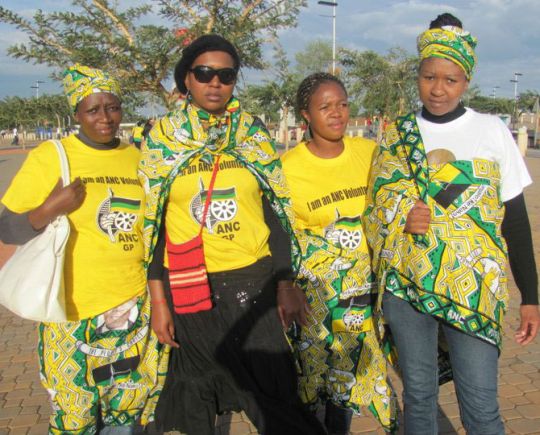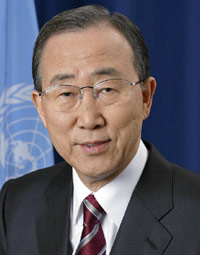Ban calls for South African political party to continue fight against discrimination
Ban calls for South African political party to continue fight against discrimination
 Supporters of the African National Congress attend a rally in Johannesburg, South Africa
Supporters of the African National Congress attend a rally in Johannesburg, South Africa
Secretary-General┬ĀBan Ki-moon commemorated the centenary of South AfricaŌĆÖs ruling party, the African National Congress (ANC), hailing its successes as a key liberation movement in the country but also calling for its continued determination to defend the principles of freedom, justice and non-discrimination.
ŌĆ£The African National Congress is more than a political party. It is a movement ŌĆō a tangible expression of a vision,ŌĆØ Mr. Ban said yesterday in a┬Āmessage. ŌĆ£The commitment and sacrifice of its members led to the emancipation of a nation. The justness of its cause attracted support from around the world, from all races and religions.ŌĆØ
The African National Congress is more than a political party. It is a movement ŌĆō a tangible expression of a vision.
Mr. Ban underscored the role that the ANC has played in helping South Africa establish firm foundations, citing a tradition of smooth democratic transitions as well as a progressive constitution which gives women one third of the seats in Parliament as elements that have ensured the countryŌĆÖs progress. He also highlighted the countryŌĆÖs robust economy and its growing influence in continental and global affairs.
ŌĆ£All these examples of progress are testament to the ANCŌĆÖs success,ŌĆØ he said. ŌĆ£Yet with such success also comes great responsibility. The power of the ANC lies not just in the numbers of people who vote for it, but the vision for which it stands.ŌĆØ
Mr. Ban stressed that the ANC must strive to achieve its vision of a non-racial democracy, which he said is not just an issue relevant to South Africa but to the whole world.
ŌĆ£The struggle for freedom, justice, human rights and non-discrimination is a global battle,ŌĆØ he said. ŌĆ£Defeating racism, tribalism, intolerance and all forms of discrimination will liberate us all.ŌĆØ
###
New York,┬Ā8┬ĀJanuary┬Ā2012 – Secretary-General’s message on the centenary of the African National Congress
Three years ago, I had the great honour to meet Nelson Mandela. I tried to thank him for all he had done, but he interrupted me. The thanks, he said, should go to the millions of men and women in South Africa and around the world who stood up for freedom and justice and liberated South Africa from the bonds of apartheid.
Madiba’s words capture the essence of what we are celebrating this year: a hundred-year struggle for the universal values of human dignity and equality. The African National Congress is more than a political party. It is a movement ŌĆō a tangible expression of a vision. The commitment and sacrifice of its members led to the emancipation of a nation. The justness of its cause attracted support from around the world, from all races and religions. Overwhelmingly, people around the world, not just in South Africa, want this non-racial democracy to succeed.
Under the leadership of the ANC, the new South Africa has established firm foundations. It has built a tradition of smooth democratic transition. It has a progressive constitution that gives women one-third of the seats in parliament and enshrines rights that even developed countries have yet to guarantee. South Africa has a robust economy, and is an influential voice in continental and world affairs. Last December, it hosted the important climate change negotiations in Durban.
All these examples of progress are testament to the ANC’s success. Yet with such success also comes great responsibility. The power of the ANC lies not just in the numbers of people who vote for it, but the vision for which it stands. This has always been the movement’s strength. Today the people of South Africa and the world yearn to see the complete realization of this vision, and are relying on the ANC to achieve it.
┬ĀThe struggle for freedom, justice, human rights and non-discrimination is a global battle. I count on the ANC’s continued determination to defend the principles enshrined in the United Nations Charter and Universal Declaration of Human Rights. Defeating racism, tribalism, intolerance and all forms of discrimination will liberate us all.
###

Ban Ki-moon
Secretary-General of the United Nations.
Ban Ki-moon is the eighth Secretary-General of the United Nations. His priorities have been to mobilize world leaders around a set of new global challenges, from climate change and economic upheaval to pandemics and increasing pressures involving food, energy and water. He has sought to be a bridge-builder, to give voice to the worldŌĆÖs poorest and most vulnerable people, and to strengthen the Organization itself.ŌĆ£I grew up in warŌĆØ, the Secretary-General has said, ŌĆ£and saw the United Nations help my country to recover and rebuild.┬Ā That experience was a big part of what led me to pursue a career in public service.┬Ā As Secretary-General, I am determined to see this Organization deliver tangible, meaningful results that advance peace, development and human rights.ŌĆØMr. Ban took office on 1 January 2007. Highlights of his tenure have included:
Promoting sustainable development
One of the Secretary-GeneralŌĆÖs first major initiatives was the 2007 Climate Change Summit, followed by extensive diplomatic efforts that have helped put the issue at the forefront of the global agenda.┬Ā Subsequent efforts to focus on the worldŌĆÖs main anti-poverty targets, the Millennium Development Goals, have generated more than $60 billion in pledges, with a special emphasis on Africa and the new Global Strategy on WomenŌĆÖs and ChildrenŌĆÖs Health.┬Ā At the height of the food, energy and economic crises in 2008, the Secretary-General successfully appealed to the G20 for a $1 trillion financing package for developing countries and took other steps to guide the international response and protect the vulnerable and poor.
Empowering women
The Secretary-General pressed successfully for the creation of UN Women, a major new agency that consolidates the UNŌĆÖs work in this area.┬Ā His advocacy for womenŌĆÖs rights and gender equality has also included the ŌĆ£Unite to End Violence against WomenŌĆØ campaign, the ŌĆ£Stop Rape NowŌĆØ initiative, the creation of a ŌĆ£Network of Men LeadersŌĆØ and the establishment of a new Special Representative on Sexual Violence in Conflict.┬Ā Within the UN itself, the Secretary-General has increased the number of women in senior management positions by more than 40 per cent, reaching the highest level in the OrganizationŌĆÖs history.
Supporting countries facing crisis or instability
The Secretary-General has sought to strengthen UN peace efforts, including through the New Horizons peacekeeping initiative, the Global Field Support Strategy and the Civilian Capacity Review, a package of steps to improve the impact of the 120,000 United Nations ŌĆ£blue helmetsŌĆØ operating in the worldŌĆÖs conflict zones. A mediation support unit, along with new capacity to carry out the Secretary-GeneralŌĆÖs good offices, have been set up to help prevent, manage and resolve tensions, conflicts and crises.┬Ā Accountability for violations of human rights has received high-level attention through inquiries related to Gaza, Guinea, Pakistan and Sri Lanka, legal processes in Lebanon and Cambodia, and advocacy for the ŌĆ£responsibility to protect,ŌĆØ the new United Nations norm aimed at prevent and halt genocide and other grave crimes.┬Ā He has also sought to strengthen humanitarian response in the aftermath of mega-disasters in Myanmar (2008), Haiti (2010) and Pakistan (2010), and mobilized UN support for the democratic transitions in North Africa and the Middle East.
Generating new momentum on disarmament, arms control and non-proliferation
The Secretary-General has sought to rejuvenate the disarmament agenda through a five-point plan, efforts to break the deadlock at the Conference on Disarmament and renewed attention to nuclear safety and security in the aftermath of the tragedy at the Fukushima Daiichi Nuclear Power Plant.
Strengthening the UN
The Secretary-Generalhas introduced new measures aimed at making the United Nations more transparent, effective and efficient.┬Ā These include heightened financial disclosure requirements, compacts with senior managers, harmonization of business practices and conditions of service, the adoption of International Public Sector Accounting Standards, and continued investments in information technology and staff development.
Personal
The Secretary-General was born in the Republic of Korea on 13 June 1944.┬Ā He received a bachelor’s degree in international relations from Seoul National University in 1970. In 1985, he earned a master’s degree in public administration from the Kennedy School of Government at Harvard University.At the time of his election as Secretary-General, Mr. Ban was his country’s Minister of Foreign Affairs and Trade. His 37 years of service with the Ministry included postings in New Delhi, Washington D.C. and Vienna, and responsibility for a variety of portfolios, including Foreign Policy Adviser to the President, Chief National Security Adviser to the President, Deputy Minister for Policy Planning and Director-General of American Affairs.Mr. BanŌĆÖs ties to the United Nations date back to 1975, when he worked for the Foreign Ministry’s United Nations Division. That work expanded over the years, with assignments that included service as Chairman of the Preparatory Commission for the Comprehensive Nuclear Test Ban Treaty Organization and Chef de Cabinet during the Republic of Korea’s 2001-2002 presidency of the UN General Assembly.┬Ā Mr. Ban has also been actively involved in issues relating to inter-Korean relations.The Secretary-General speaks English, French and Korean. He and his wife, Madam Yoo (Ban) Soon-taek, whom he met in high school in 1962, have one son, two daughters and three grandchildren.┬Ā Since 2007, Mrs. Ban has devoted her attention to womenŌĆÖs and childrenŌĆÖs health, including autism, the elimination of violence against women, and the campaign to prevent mother-to-child transmission of HIV/AIDS.
###
> United Nations (UN).
 The United Nations was established on 24 October 1945 by 51 countries committed to preserving peace through international cooperation and collective security. Today, nearly every nation in the world belongs to the UN: membership totals 192 countries.
The United Nations was established on 24 October 1945 by 51 countries committed to preserving peace through international cooperation and collective security. Today, nearly every nation in the world belongs to the UN: membership totals 192 countries.
When States become Members of the United Nations, they agree to accept the obligations of the UN Charter, an international treaty that sets out basic principles of international relations. According to the Charter, the UN has four purposes:
- to maintain international peace and security;
- to develop friendly relations among nations;
- to cooperate in solving international problems and in promoting respect for human rights;
- and to be a centre for harmonizing the actions of nations.
###
* The above story is adapted from materials provided by┬ĀUnited Nations (UN)
** More information at┬ĀUnited Nations (UN)




















